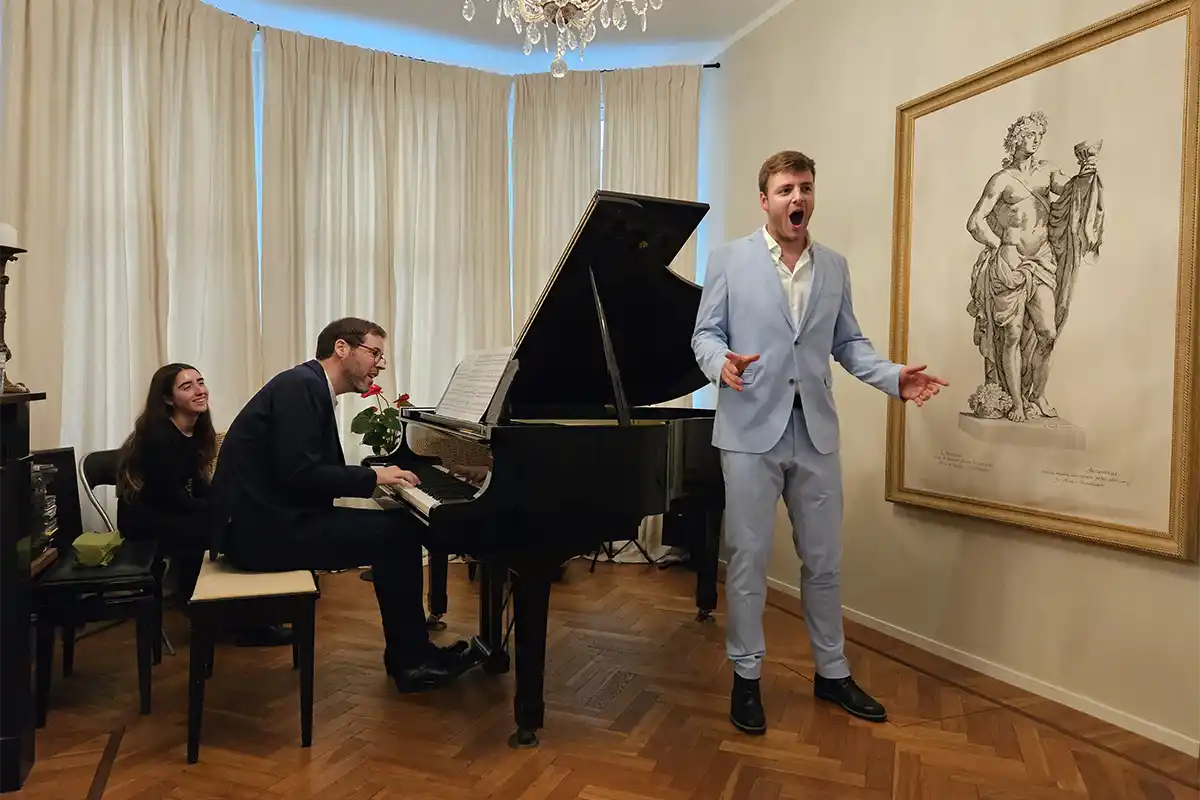
Guyon and Hugo both study at Codarts Rotterdam and Marcel Reijans, head of the vocal department, was able to attend this afternoon.
Of course, yours truly had only just recovered from all the wonderful theatrical singing at the International Vocal Competition. A more theatrical approach is also gladly enjoyed during a recital at Friends of Song. However, it is striking how students and recent graduates choose the pure form of the song recital with us. And why not, because however enchanting the adventure, coming home again and then being sung to by a fine singer or singer, simply by the side of the piano, yes, how nice and intimate that is.
Guyon Mingelen proved to be an engaging storyteller with a great love for the art of song. He knew exactly what he was doing. For instance, he talked about his discovery of the interesting composer Guy Ropartz and his beautiful songs set to poems by Heine. Heine's poems had been translated into French by Ropartz himself, together with poet Pierre-René Hirsch, for these compositions. Guyon, via Diepenbrock, once again brought us on the romantic trail of Jacques Perk, already deceased at the age of 22 but seen as the instigator of the romantic poetry group De Tachtigers. He fell in love with Mathilde, a lady he had met during a short holiday in La Roche-en-Ardenne in 1879. He would never see her again afterwards but wrote a hundred or so sonnets about Mathilde, a form Perk masterfully mastered and renewed. Diepenbrock's Evening song on a poem by Perk was a wonderful performance by the two gentlemen. Before the interval, it was all enjoyment. After the interval, deep emotion followed.
Of course, all three of Ravel's Don Quixote songs are very familiar to us. But the audience wanted with applause even after the second song, Chanson épique, expressing appreciation. I myself had never heard the song so sincere and beautiful. Finally, the Songs of Travel by Ralph Vaughan Williams effortlessly beautiful and expressive. In this final cycle, the pianist flourished, who had always been sensitive and obliging but here, as in the two piano solo works, knew how to confidently fill in the depth and sharpness of the colours. The lines of poetry by Robert Louis Stevenson - from his Songs of Travel and other verses ... - aptly sum up this recital:
‘Bright is the ring of words, when the right man rings them,
’fair the fall of songs when the singer sings them'
Francine van der Heijden
| Cookie | Duration | Description |
|---|---|---|
| cookielawinfo-checkbox-analytics | 11 months | This cookie is set by GDPR Cookie Consent plugin. The cookie is used to store the user consent for the cookies in the category "Analytics". |
| cookielawinfo-checkbox-functional | 11 months | The cookie is set by GDPR cookie consent to record the user consent for the cookies in the category "Functional". |
| cookielawinfo-checkbox-necessary | 11 months | This cookie is set by GDPR Cookie Consent plugin. The cookies is used to store the user consent for the cookies in the category "Necessary". |
| cookielawinfo-checkbox-others | 11 months | This cookie is set by GDPR Cookie Consent plugin. The cookie is used to store the user consent for the cookies in the category "Other. |
| cookielawinfo-checkbox-performance | 11 months | This cookie is set by GDPR Cookie Consent plugin. The cookie is used to store the user consent for the cookies in the category "Performance". |
| viewed_cookie_policy | 11 months | The cookie is set by the GDPR Cookie Consent plugin and is used to store whether or not user has consented to the use of cookies. It does not store any personal data. |